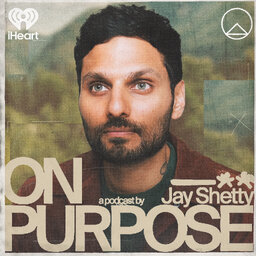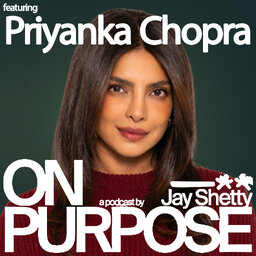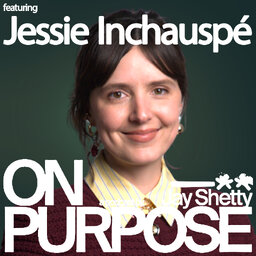Selena Gomez ON: Befriending Your Inner-Critic & How to Speak to Yourself With More Compassion
You can order my new book 8 RULES OF LOVE at 8rulesoflove.com or at a retail store near you. You can also get the chance to see me live on my first ever world tour. This is a 90 minute interactive show where I will take you on a journey of finding, keeping and even letting go of love. Head to jayshettytour.com and find out if I'll be in a city near you. Thank you so much for all your support - I hope to see you soon.
Today, I am talking to a good friend and celebrity, Selena Gomez. Selena is a globally and culturally celebrated artist, actor, producer, entrepreneur, and philanthropist of her generation. As a recording artist, Selena has sold more than 210 million singles worldwide and has over 45 billion global streams. Her upcoming biographical documentary, Selena Gomez: My Mind & Me, is out right now. In 2019, she launched her beauty line, Rare Beauty, exclusively with Sephora. As part of the partnership, Selena announced the Rare Impact Fund pledging to raise $100M for mental health services for individuals in underserved communities. Philanthropy and activism have been key pillars of her career and she's used her platform to advocate for many important causes. Selena has raised millions of dollars for charity including Global Citizen and Lupus Research Alliance.
Selena bravely tells her story about her long battle with mental health and how this led to her life mission to help spread mental health awareness around the world and provide mental health services for the less privileged. I get to deeply understand her inner thoughts on topics such as dealing with pressure of being a celebrity and the gossip that comes with it, finding self healing, embracing change, being one with your inner self, and living day by day being content, kind, and full of love to share.
Life isn’t a simple journey, but despite the complications, challenges, and struggles, we can always find it in our hearts to tap into our inner good and be compassionate, especially to ourselves.
What We Discuss:
- 00:00:00 Intro
- 00:04:21 Selena Gomez: My Mind & Me documentary
- 00:06:59 Sharing our darkest secrets with others
- 00:10:04 Befriending your own inner critic
- 00:13:39 Learning to be more compassionate towards yourself and others
- 00:18:59 Taking control of your own story
- 00:26:04 Getting asked frustrating questions
- 00:24:39 No one is perfect, even celebrities
- 00:27:40 How do you deal with imperfections?
- 00:33:03 Areas in your life that made you who you are
- 00:35:07 Embracing change
- 00:39:36 Mental health awareness
- 00:43:59 You have to be aware of people
- 00:48:10 How do you deal with fears?
- 00:51:23 What is your intention?
- 00:56:13 Sometimes parents project perfection around their children
- 00:59:57 Pain, suffering, growth
- 01:06:09 Wondermind - mental fitness
- 01:09:30 You’ll figure it out, keep going
- 01:12:18 Missteps parents may have taken
- 01:23:07 Producing the series 13 Reasons Why
- 01:27:50 Selena and Mandy on Final Five
Episode Resources
- Selena Gomez | Website
- Selena Gomez | Facebook
- Selena Gomez | Twitter
- Selena Gomez | Instagram
- Selena Gomez | YouTube
Do you want to meditate daily with me? Go to go.calm.com/onpurpose to get 40% off a Calm Premium Membership. Experience the Daily Jay. Only on Calm
Want to be a Jay Shetty Certified Life Coach? Get the Digital Guide and Workbook from Jay Shetty
https://jayshettypurpose.com/fb-getting-started-as-a-life-coach-podcast/
In 1 playlist(s)
On Purpose with Jay Shetty
My name is Jay Shetty, and my purpose is to make wisdom go viral. I’m fortunate to have fascinating …Social links
Follow podcast
Recent clips

Don't Waste Your Life (Use THIS Daily Shift To Build a Life That ACTUALLY Feels Meaningful)
21:42

PRIYANKA CHOPRA JONAS: Fame, Motherhood, Love and the Moment That Changed Everything
1:49:49

Jessie Inchauspé: 90% of Pregnant People Are Missing THIS Nutrient (Follow THIS Simple Diet To Reduce Glucose Spikes & Protect Your Baby’s Brain & Metabolism)
1:12:12
 On Purpose with Jay Shetty
On Purpose with Jay Shetty